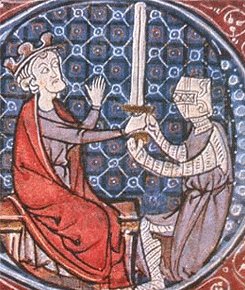Knight
(Redirected from Knighthood)
Knight is a title of honor bestowed upon individuals for their service to a monarch or a country, especially in a military context. The concept of knighthood has its roots in the Middle Ages, originating in Europe, and has evolved over centuries to encompass various levels of social status, duties, and honors. Knights played a significant role in the feudal system, serving as heavily armored cavalrymen in the service of their lords. The path to becoming a knight often began in childhood, with boys serving as pages and then squires, undergoing rigorous training in arms, horsemanship, and the codes of chivalry.
History[edit | edit source]
The history of knighthood can be traced back to the early medieval period, with the emergence of mounted warriors who swore allegiance to a lord or king. These warriors were granted land in exchange for military service, a practice that laid the foundation for the feudal system. The concept of chivalry, a code of conduct that emphasized bravery, honor, and respect for women and the weak, became closely associated with knighthood during the High Middle Ages. Tournaments and jousts were held as a way for knights to practice their skills and gain renown.
Ceremony[edit | edit source]
The ceremony of dubbing a knight has remained relatively unchanged over the centuries. It typically involves a symbolic act of the monarch or a noble tapping the squire on the shoulders with a sword, accompanied by the words "I dub thee knight." This act is often part of a larger ceremony that includes religious blessings and the presentation of regalia associated with knighthood, such as a sword, spurs, and a coat of arms.
Types of Knights[edit | edit source]
Knighthood encompasses various orders and titles, each with its own history and significance. Some of the most well-known include:
- Order of the Garter: Founded in 1348 by King Edward III of England, it is one of the oldest and most prestigious orders of chivalry. - Order of the Golden Fleece: Established in 1430 by Philip the Good, Duke of Burgundy, this order was created to celebrate the Burgundian court's wealth and power. - Knights Templar: A religious military order founded in the 12th century, known for their role in the Crusades and their distinctive white mantles with a red cross.
Modern Knighthood[edit | edit source]
In the contemporary world, the title of knight has largely become a ceremonial honor awarded by monarchs and governments to individuals for their contributions to society, the arts, science, and other fields. Countries such as the United Kingdom and the Netherlands have orders of knighthood that recognize such contributions. While the military and feudal connotations of knighthood have diminished, the ideals of chivalry and service continue to be associated with the title.
In Popular Culture[edit | edit source]
Knighthood and the chivalric code have had a profound impact on literature and popular culture, inspiring countless works of fiction, from the Arthurian legends to modern fantasy novels and films. The image of the knight as a noble warrior fighting for justice and honor continues to resonate in contemporary society.
| This article is a stub. You can help WikiMD by registering to expand it. |
Search WikiMD
Ad.Tired of being Overweight? Try W8MD's physician weight loss program.
Semaglutide (Ozempic / Wegovy and Tirzepatide (Mounjaro / Zepbound) available.
Advertise on WikiMD
|
WikiMD's Wellness Encyclopedia |
| Let Food Be Thy Medicine Medicine Thy Food - Hippocrates |
Translate this page: - East Asian
中文,
日本,
한국어,
South Asian
हिन्दी,
தமிழ்,
తెలుగు,
Urdu,
ಕನ್ನಡ,
Southeast Asian
Indonesian,
Vietnamese,
Thai,
မြန်မာဘာသာ,
বাংলা
European
español,
Deutsch,
français,
Greek,
português do Brasil,
polski,
română,
русский,
Nederlands,
norsk,
svenska,
suomi,
Italian
Middle Eastern & African
عربى,
Turkish,
Persian,
Hebrew,
Afrikaans,
isiZulu,
Kiswahili,
Other
Bulgarian,
Hungarian,
Czech,
Swedish,
മലയാളം,
मराठी,
ਪੰਜਾਬੀ,
ગુજરાતી,
Portuguese,
Ukrainian
Medical Disclaimer: WikiMD is not a substitute for professional medical advice. The information on WikiMD is provided as an information resource only, may be incorrect, outdated or misleading, and is not to be used or relied on for any diagnostic or treatment purposes. Please consult your health care provider before making any healthcare decisions or for guidance about a specific medical condition. WikiMD expressly disclaims responsibility, and shall have no liability, for any damages, loss, injury, or liability whatsoever suffered as a result of your reliance on the information contained in this site. By visiting this site you agree to the foregoing terms and conditions, which may from time to time be changed or supplemented by WikiMD. If you do not agree to the foregoing terms and conditions, you should not enter or use this site. See full disclaimer.
Credits:Most images are courtesy of Wikimedia commons, and templates, categories Wikipedia, licensed under CC BY SA or similar.
Contributors: Prab R. Tumpati, MD






